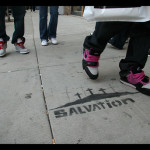We run our website the way we wished the whole internet worked: we provide high quality original content with no ads. We are funded solely by your direct support. Please consider supporting this project.

What is “Original Sin”?
I get asked about “original sin” quite a bit. Are people born guilty? Many times questions like this originate from folks who are worried about whether babies who die without being baptized go to hell. This is what I was taught as a young Catholic boy, and I have to confess I now find the concept to be as morally offensive as it is unbiblical.
It’s true that we’re born into spiritual slavery and into a corrupted creation. Our physical, mental and spiritual make up is, in varying degrees, damaged from the start. And there’s no doubt that this renders it inevitable that we will in time join the rebellion by sinning. But there’s absolutely no support for the bizarre idea that babies are in some sense guilty and in danger of hell before they ever sin!
If we want to talk about “original sin” in a biblical way, we need to go back to the time when humans were first co-opted into the rebellion. In Genesis 3 we find that the “original sin” was eating from the Tree of the Knowledge of Good and Evil. This is the sin of trying to acquire life—that is our identity, worth, significance and security—on our own, and of trying to know what only God can know. It’s the sin of mistrusting God and thinking we can define “good” and “evil” for ourselves. It’s the sin of playing God by judging.
This sin is the “original sin” not just in the sense of being first, but also in the sense of being foundational to all other sin. Whenever we rebel against God, the only true source of life, and try to derive life from non-divine sources, we involve ourselves in judgment. We set ourselves up as the arbiters and definers of “good” and “evil” and critically assess God, ourselves, others, and everything else through this judging filter. Living in perpetual hunger, we view everything in terms of its potential as idolatrous food. Basically, things are “good” when they enhance our sense of worth, significance, and security, and things are “evil” when they threaten our sense of worth, significance, and security.
The most common manifestation of original sin is the way we contrast ourselves with others. In a pathetic attempt to ascribe worth, significance, and security to ourselves, we arbitrarily devise criteria that, to our own minds at least, reveal that our family, tribe, class, race, culture, religion, political ideology, or nation are better than others. Instead of ascribing worth to others at cost to ourselves, which is our primary job as humans made in the image of the servant God, we ascribe worth to ourselves at the expense of others.
This is the “original sin,” for this kind of judgment is antithetical to, and the main inhibitor of, love. Not only this, but because “original sin” transforms individuality, tribes, classes, races, cultures, religions, political ideologies and nations into idolatrous sources of life while setting them in competition with one another, judgment lies at the root of all violence. The Accuser makes us accusers of God, ourselves, and each other and delights in the monotonous bloodbath that ensues.
The good news is that, by absorbing the full wrath of the Accuser’s judgment on Calvary, Jesus in principle disempowered judgment (Col 2:14-16). Jesus thereby reconnects us with our true source of life, satisfies the hunger in our innermost being, and frees us from our addiction to the forbidden tree. In this way, he empowers us to love God, ourselves, and others with the same unconditional love God has for us.
Photo credit: Internet Archive Book Images via VisualHunt.com
Category: General
Tags: Idolatry, Sin, Sinful Nature, Tree of the Knowledge of Good and Evil
Topics: Sin
Related Reading

Why is the Bible so strict on prohibiting pre-marital sex? What’s the big deal?
Today in western culture people tend to have a rather “recreational” view of sex. It’s just a pleasurable physical activity we engage in. Even people who don’t consciously believe this are influenced by it , since we’re bombarded with this message every day through movies, television shows, radio, magazines, etc. Because we’re influence by this…

Is homosexuality a sin?
There are three passages in the Old Testament (Gen. 19: 1-13; Lev 18:22; 20:13) and three in the New Testament (Rom. 1:26-27; 1 Corinthians 6:9-10; I Tim. 1:10) that have traditionally been read as prohibiting homosexuality. On top of this, the entire biblical narrative presupposes that sex is supposed to take place between a man…

What Does it Mean to be “Saved”?
The common legal-framework view of salvation encourages people to understand it as mere acquittal, but there is much more to it than that. First let’s consider what God saved us FROM. It’s certainly true that God saved us from the fatal consequences of our sin by forgiving us. But the New Testament’s view of salvation…

Is the Bible against body piercing and tattoos?
Some Christians argue against body piercing and tattoos on the basis of a couple of Old Testament verses that prohibit them (Lev. 19:28). Several years back an aggravated lady tried to get me to preach against these things in my church (she’d observed that a number of people in the congregation had body piercings and…

Generous Grace
Michelle Brea via Compfight Mark McIntyre wrote a piece on his blog called Selective Grace that highlights the ways in which the church tends to more easily demonstrate grace with some than with others. It’s a call to a more generous grace that does not distinguish between particular sins or particular differences in belief. How…

Which Came First: Death or Sin? (podcast)
Greg investigates the laws of nature, the nature of law, the fall of the powers, and the power of the fall in this enlightening episode that evolves right up to the climactic ending. Episode 561 http://traffic.libsyn.com/askgregboyd/Episode_0561.mp3
